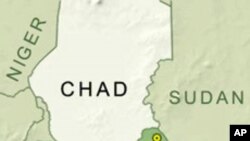The United Nations warns persistent insecurity in Eastern Chad is preventing aid agencies from carrying out their humanitarian work. The U.N. says increased acts of banditry are putting assistance programs for tens of thousands of needy people at risk.
The United Nations says bandits in Eastern Chad attack civilians, humanitarian workers and even members of the police force, especially in border areas. It says the kidnapping of relief workers is a worrying new element in bandit operations.
On November 9, an aid worker for the International Committee of the Red Cross was kidnapped near the Sudanese border. A couple of weeks later, compounds of two non-governmental organizations were attacked in Birao in northeastern Central African Republic.
Two French nationals were kidnapped in this volatile area, which also is near the Sudanese border.
A U.N. humanitarian spokeswoman, Elizabeth Byrs, says these and other acts of insecurity have caused the ICRC and other aid agencies to temporarily suspend their humanitarian operations in Eastern Chad.
She says nearly 97,000 people in need are at risk of deteriorating living conditions due to the continued suspensions or reduction of operations by several aid agencies.
Byrs warns if the situation continues to deteriorate and aid agencies are not able to resume their normal activities, these people will continue to suffer. They will especially lose out in areas of protection, water and sanitation, food security, and health care.
About 70 humanitarian organizations work in Eastern Chad. They provide assistance to 256,700 Sudanese refugees, 168,000 internally displaced people and around 150,000 people in host villages affected by the crisis.
Recent surveys indicate national agricultural production has decreased by 30 percent because of the late start of the rainy season and weak rainfalls in some parts of the country.
Early last month, aid agencies had planned to carry out food assessments in the eastern region. Assessments were carried out in the Dar Sila region, but not in the volatile Assoungha region. This is because the ICRC expert who had been sent to conduct the survey was kidnapped.
Byrs says both the U.N. Peacekeepers and Chadian authorities have been asked to increase their patrols and to strengthen the protection of civilians and humanitarians.
U.N. aid workers must travel with an armed escort. Those who work for non-governmental organizations do not have to. Many private aid agencies refuse armed escorts because they believe this clashes with their humanitarian mission.
Nevertheless, Byrs says it is important the U.N. peacekeepers who are stationed in the region continue to offer their protective services to non-governmental agencies.
News
Banditry Impedes Assistance Programs In Eastern Chad
- By Lisa Schlein
update

The United Nations warns persistent insecurity in Eastern Chad is preventing aid agencies from carrying out their humanitarian work. The U.N. says increased acts of banditry are putting assistance programs for tens of thousands of needy people at risk.



